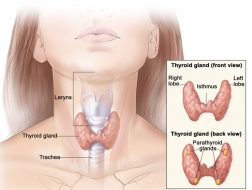Thyroid Health in Women

The thyroid hormones effect every cell in the body by the help of receptor sites. All cells need thyroid hormones for energy, metabolism and health.
Thyroid disease is one of the most common endocrine illnesses in women of reproductive age and if unrecognised, it can increases the risk of pregnancy problems like miscarriages & placental abruption as well as hypertensive disorders and other hormonal problems.
The two most common thyroid problems stemming from an autoimmune base are Hashimoto’s (hypothyroidism) and Grave’s (hyperthyroidism) disease.
It must be noted that genetics only play a small part in the prevalence of these thyroid problems, though environment (food, water, air, toxins, emotions etc) play a larger part in the diseases development. As Caldwell Esselstyn says, “Genetics load the gun, lifestyle pulls the trigger.”
The Thyroid and Autoimmunity
The increase in thyroid disease has shown a vast increase in research not only in traditional medicine but also alternative. I just finished a book by Dr Datis Kharrazian called “Why Do I Still Have Thyroid Symptoms Even Though My Lab Tests Are Normal” (was a great book!) and in it he says that 90% of thyroid disease has an autoimmunity component.
There are three reasons why autoimmunity may affect the thyroid;
- Genetic component (not necessarily always expressed in members of your family)
- Environmental (food and chemicals)
- Gut and digestion issues
There is not much you can do about genetics but there is a lot you can do about environment and gut/digestive issues so in this post I thought to concentrate on these two factors as these will effect genetic expression.
Why does the body turn against itself and start consuming itself (autoimmunity). This is still not clear but thoughts are virus, bacteria, heavy metals, chemicals, the antecedents of our life and of course diet. The epidemic in poor gut health can also be put down to medications, the pill, steroids, antibiotics, as well as processed foods filled with preservatives.
Lack of sleep, poor diet and indiscriminate use of medications all play a role in poor gut health.
Now there are some different thyroid problems that we can have and I'll list them below.
Grave’s disease:
This occurs when the thyroid gland becomes overactive, generating too much thyroid hormones.
Symptoms:
-Sleep issues or insomnia
-Diarrhoea
-Weight loss
-Increased appetite
-Heart palpitations
-Fatigue
-Mood swings
-Irritability
-Increased sweating
-Enlarged thyroid gland.
Hashimoto’s disease:
This occurs when the thyroid gland becomes underactive, due to not enough production of the thyroid hormones.
Symptoms:
-Fatigue
-Weight gain
-Mood issues
-Depression
-Constipation
-Dry skin
-Sensitivity to cold
-Decreased libido
-Menstrual cycle changes
-Sleep issues or insomnia.
Thyroid Tests
If you feel like you might be having thyroid issues, it's important to seek testing via a full thyroid analysis to provide a proper diagnosis or a greater understand of the health of your thyroid.
This includes testing of the following:
-the thyroid stimulating hormone (TSH)
-Free T4
-Free T3
-Reverse T3
-Peroxidase antibodies
-Thyroglobulin antibodies.
-For nutrients that support thyroid health, it is great to get these tested; ferritin, vitamin D3, Selenium, zinc (in conjunction with zinc taste testing), magnesium and urinary iodine.
Inflammatory foods
Due to the two most common thyroid problems stemming from an autoimmune base, it is absolutely crucial to calm down the immune system by removing inflammatory foods from the diet.
Some inflammatory foods include:
-Gluten from wheats, oats, rye, spelt and barley
-Refined vegetable oils such as sunflower, safflower, soybean or corn oil and more
-Corn, particularly if it’s not organic
-Soy, particularly if it isn’t organic or been fermented
-Artificial colours and flavours
-If you have already eliminated the above foods, you may need to consider nightshade vegetables (the main ones are – potatoes, tomatoes, eggplant and peppers/capsicum), eggs, nuts, grains and/or legumes.
These foods stimulate your immune system, which will increase the attack on your thyroid and therefore worsen your condition and/or stop health improvements.
Foods that women can consume on a regular basis to support thyroid health
Iodine rich foods such as kelp noodles, dulse flakes and in some cases, women can supplement with liquid iodine that is painted on the skin only. NB Everyone requires different amounts of iodine depending on the individual’s circumstances, so it is important to seek professional help to assist in understanding your needs. One way to do this is through urinary iodine testing with your GP.
-Foods rich in selenium which include activated brazil nuts, liver, sardines, chicken, beef and tuna
-Liver, to ensure you receive an array of B vitamins, zinc and iron
-Wild caught fish for Omega 3 fatty acids
-Green vegetables, to support detoxification and to receive an array of micronutrients.
Your thyroid relies upon many nutrients though in particular iodine, so the list of the foods above is essential for maintaining or improving your thyroid health.
Other things to consider
-Treat any potential gut infections to create a balanced amount of beneficial bacteria
-Make sleep a priority
-Ensure you receive adequate amounts of sunshine daily
-Do more of what you love to reduce stress and enhance happiness
-Seek personalised advice through a trusted holistic practitioner.
-For pregnant women, it is crucial to pay attention to your nutrition and taking extra care, as the body changes dramatically during pregnancy.
Join the other 10,000+ who get my best fitness, diet & mindset tips.



Comments